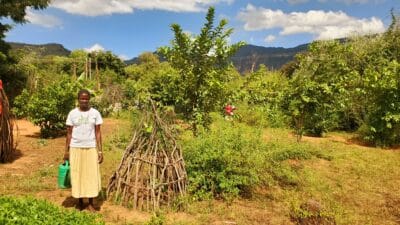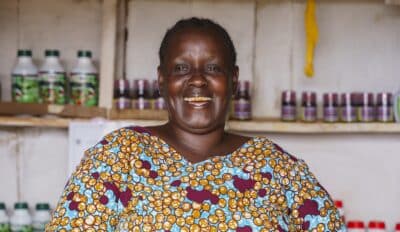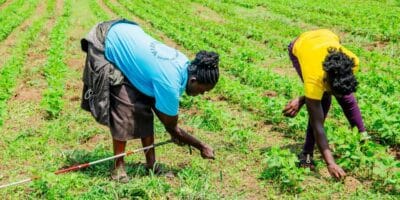Expert view
15 May 2019
The parallels between British and Kenyan farming

By Adam Bedford, North East Regional Director, National Farmers Union
The National Farmers Union (NFU) and the international charity Farm Africa have a close relationship, in more ways than one. The NFU has been a long-time supporter of Farm Africa’s work. Having run the London marathon in 2016, a few of us donned Farm Africa yellow vests once again in April, including the President and Vice Presidents of NFU, Minette Batters and Stuart Roberts. We ran in support of the charity’s Coffee is life appeal, to raise funds to help more farmers across eastern Africa increase their harvests, build their incomes and sustain natural resources.
At the NFU, we’re proud to be in the business of giving British farmers a voice and developing a stable and sustainable future for British agriculture. In Farm Africa, I see clear parallels. Farm Africa helps farmers to take an environmentally sustainable and business-led approach to sell more and sell for more. These farmers might be based in countries like Kenya or Tanzania – both countries I’ve been privileged to visit with Farm Africa – but I believe farmers in the UK and in Africa share a common interest.
Issues such as climate change, succession and commodity price volatility to name just three – these are concerns those of us who work in agriculture share right across the globe. The scales and specific contexts might be different, but at the bottom of everything farmers face similar challenges and can learn a lot from each other’s approaches in dealing with them.

WHY
I feel incredibly privileged to have been some small part of Farm Africa’s work in recent years – I’ve enjoyed raising money for their incredible projects – but I’ve found my visits to Tanzania and Kenya to be enriching and educational beyond words. The people I’ve met, the relationships I’ve formed, the things I’ve learnt and the perspective it’s given me has proven invaluable, both personally and professionally.
The most important element of farming I believe is the people. That’s why I do what I do. Agriculture is all about the individuals and the networks and relationships that spring up between them in farming communities. It’s a way of living and working that grabs hold of you and doesn’t let go. The same could be said of getting involved with Farm Africa – it’s an experience that grabs hold of you and doesn’t let go.
I first visited a Farm Africa project in Tanzania four years ago, working with farmers to build beehives to supply a new market for honey as a new income source at the same time as reducing deforestation. What struck me, however, more than the entrepreneurial spirit and environmental foresight of the project was the strength of the relationships that Farm Africa had developed with farmers on the ground.
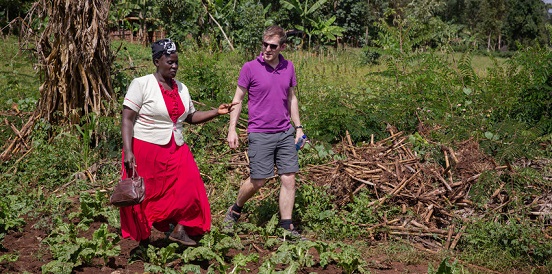
PEOPLE
This is a charity that has people and relationships at its core.
It was the people who spurred me on to do more work with Farm Africa. In Tanzania, I met Clemence Hhayuma, a farmer and furniture maker working in partnership with his wife and four children. We’re still in touch via Whatsapp and we share messages about farming and our families. I often reflect on the ease of our communication – it is easier for me to be in touch with him than it is to communicate with a hill farmer in County Durham!
What I learnt in Tanzania and more recently in Kenya was that farmers across Africa are striving for exactly the same things that farmers here in the UK are striving for – to develop their businesses, to provide for their families, to create opportunities within their communities, to reduce risk and volatility and to bring high-quality products to the market. Farm Africa is there every step of the way to support this ambition.
I saw this in Tanzania in 2014 and I saw it again in Kenya just a few months ago when a group of us went to visit the Growing Futures project, which helps young farmers escape poverty by setting up profitable horticulture businesses.
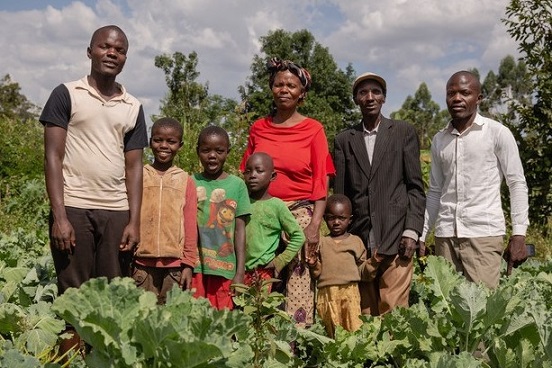
We were blown away by what we saw – such passion, resilience and ambition. Meeting Simon Kundu, his wife Mary and son Moses (pictured above) will stick with me forever. After being displaced from their land, the family is now on a new farm. With support and advice from Farm Africa, they have been able to alter their cropping patterns, supply a new and growing market with vegetables and importantly provide an opportunity for their children on the farm in their developing business.

Rachel Hallos, my NFU county chair from West Yorkshire, would be furious if I didn’t mention another Rachel who we met on the trip: a struggling maize farmer turned successful bean grower who now employs 40 women from her community. We learnt that Farm Africa goes above and beyond – they encourage the farmers they work with to think bigger and longer-term, and give them the skills, knowledge and ultimately the confidence to make their farm business successful and sustainable. Their work in empowering women like Rachel is particularly impressive.
Engaging more women in farming, encouraging young people to see agriculture as a viable career and working with farmers to develop productive and profitable businesses – there are so many parallels between the work Farm Africa does and the work we’re engaged with here in the UK with NFU. And the foundation at the bottom of everything we all do is people – people, families, relationships and livelihoods.
I urge you to consider making a donation to help Farm Africa support more farming families across eastern Africa.
%module-adboxes-565%
